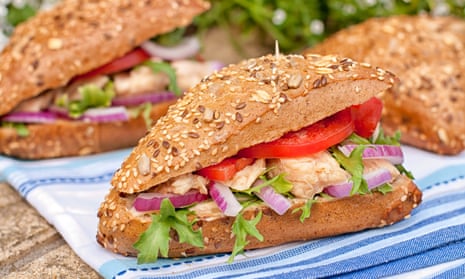Lunchtime at school can be lonely and excruciating for any 10-year-old. But for a pupil in Milan who brought a homemade sandwich to school – tunafish in wholegrain bread with sliced organic tomatoes – it led to isolation.
In an episode that made the front page of Italian newspaper Corriere della Sera, the child was removed from the cafeteria and taken to a classroom to eat on her own after her parents knowingly defied local rules that forbid any child from eating anything other than lunch provided by school.
In Milan, the sight of a humble homemade panino has become a rallying cry, a symbol for an ideological fight that has pitted a handful of parents against school administrators and local officials, raising questions about the limits of parental rights, entrenched views about food, and demands by school officials that rules be obeyed at all costs.
The story began in Turin, where a judge recently ruled in favour of dozens of families who had complained about the quality and quantity of food provided at their children’s school and were told they could provide alternatives from home.
When similarly-minded parents in Milan heard about the legal decision, they pushed for change in their own schools, sending their children to class with packed lunches as a way to protest. At the Pirelli elementary school in Niguarda, a district of Milan, multiple warnings from the headteacher culminated in one student being banished from the cafeteria and told to eat in a classroom.
What started as a spat between parents and schools has become overtly political, with representatives from the centre-left Democratic party supporting the ban on homemade lunches as a way to maintain civility and order and a representative from the conservative Forza Italia party supporting la schiscetta, or food brought from home.
For Anna Scavuzzo, who is in charge of school food policy in the city, packed lunches represent a threat to student safety.
“If you permit everyone to bring their own food, how can you be sure that something won’t happen?” said a spokeswoman for Scavuzzo’s office, pointing to the prevalence of food allergies, infections, intolerances and other problems.
Bringing food from home, she said, compromised the values the schools are trying to teach students about food and nutrition. “Lunch is an educational moment. They need to learn to sit together, to have proper, safe and organic food, and that they can’t just have potato chips and chocolate. They are in school and that means community,” the spokeswoman said.
Milan’s publicly-funded school system serves about 80,000 student lunches every day. Parents pay for the lunches according to their wealth, with most paying about €2.60 per day.
Scavuzzo’s office said the decision by the principal to isolate the child was wrong and that city officials would be clarifying what schools ought to do when faced with a rebellious onslaught of illicit panini or thermos filled with tortellini en brodo: confiscate the lunch until the end of the day and force the child to eat in the cafeteria.
Alternatively, parents are free to feed their children lunch at home.
“We invest a lot of money in this service. No child will go hungry,” the spokeswoman added. Asked about the quality of food, she pointed to efforts by the city to continuously improve food options. About 40% of food served was organic and on biodegradable materials, she said, and rice was locally sourced. The city wants all olive oil and pasta to be organic by next year.
The fledgling rebellion is seen among some as the start of a dangerous unraveling of social norms.
“We are only talking about five, six, seven people who are raising an issue with this. They are claiming the right to do what they want and it is unacceptable. If you are in school, there are rules, otherwise everything collapses. Then they will start to claim the rights over what they’re studying,” Scavuzzo’s spokeswoman said.
Marilù Santoiemma, one mother leading the fight in favour of packed lunches, told Corriere della Sera: “We don’t want [to win] at all costs. We want better quality. And for years we’ve asked for the possibility, available in other municipalities, to have school lunches on select days.”
So far, however, only a limited number of parents are challenging the system, a fact that one conservative politician, Valentina Aprea of Forza Italia, who opposes the ban, said reflected the fact that parents did not want to drag their children into the protests.
Aprea said three issues were at stake: the poor taste of the food, high costs for parents, especially for those with more than one child, and parental rights.
For children dragged from the cafeteria, homemade lunch in tow, the events have been dramatic. “My daughter told me that she cried,” one parent told Corriere, while another complained that their child had become sick and left their food untouched.

Comments (…)
Sign in or create your Guardian account to join the discussion